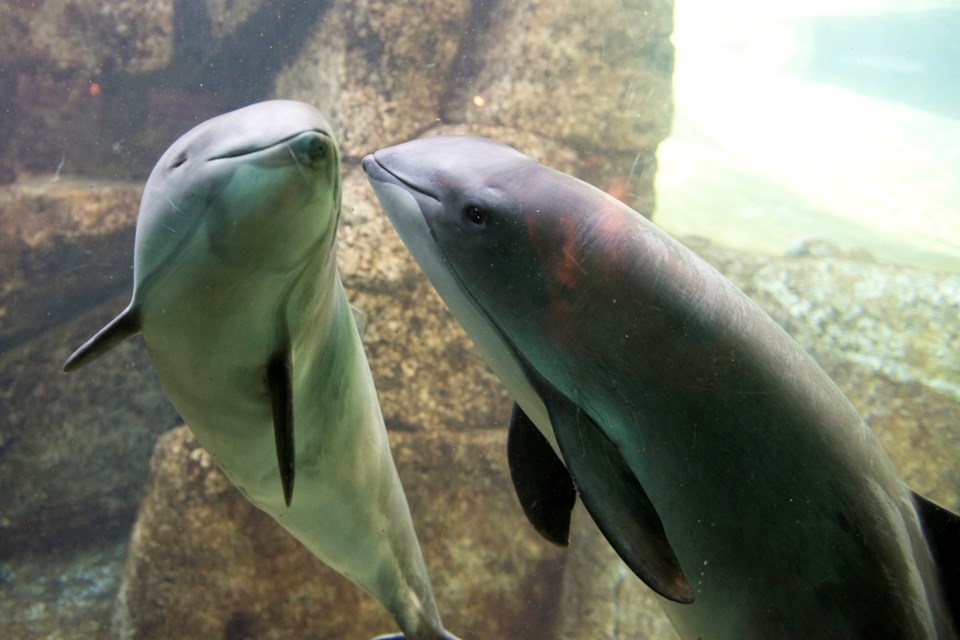How do you stop whales, porpoises and dolphins from breeding at the Vancouver Aquarium?
It’s a question the president and CEO of the aquarium found himself answering since five Vision Vancouver park board commissioners decided Thursday to ban the breeding of cetaceans at the facility in Stanley Park.
Though the aquarium has two female belugas and two female Pacific white-sided dolphins, it also has two harbour porpoises — one male and one female named Jack and Daisy, which were rescued one year apart as babies.
So how do you stop them from breeding?
“You don’t,” Nightingale told the Courier Friday by telephone. “Contraceptives have been rarely used in cetaceans. And when they have been used, it’s only for very short term issues.”
Nightingale said the harbour porpoises have lived together for three years and he described them as “best buddies.” He said keeping them in separate tanks at the aquarium “might be physically impossible and wouldn’t be the proper thing to do for them.”
If a birth were to happen at the aquarium, it’s unclear what kind of consequences the aquarium would face. The park board’s decision Thursday to ban the breeding of cetaceans at the aquarium did not set out consequences or penalties.
When told of Nightingale’s comments about not stopping the breeding of the harbour porpoises, park board chairperson Aaron Jasper said his understanding from Nightingale in an earlier conversation was that “techniques” could be used to lower or kill a male cetacean’s libido.
Jasper said if Nightingale is “signaling” that the porpoises could breed, then he will recommend to staff to give some thought to what type of penalty should be imposed when drafting the new bylaw on banning breeding.
That said, Jasper wants to know whether the porpoises have tried to mate since being brought to the aquarium. He said the best indicator of future activity is past activity.
“If the [porpoises] have not had a history of trying to couple, then chances are the odds are low that it’s going to happen,” said Jasper, noting Nightingale still hasn’t given him a clear answer on why the breeding program is necessary at the aquarium. “We are still waiting for an answer because, for us, that is the bigger question.”
The aquarium is expanding the facility and plans to have six to eight belugas when the work is complete. The aquarium has seven belugas on loan to aquariums in Georgia and San Diego. The whales are transported in a special container and loaded onto a plane.
Nightingale was still reeling from the park board’s decision to ban breeding when he spoke to the Courier Friday, saying he doesn’t believe the board should have such power to set rules for the aquarium.
“The management, the planning and the strategy for the care of the animals needs to be left in the hands of experts,” he said, noting the aquarium proposed to the park board a regular independent review of animal welfare at the aquarium.
Instead, the park board agreed Thursday to create an oversight committee comprised of animal welfare experts to ensure the safety and well-being of cetaceans. In an open letter Nightingale posted Friday on the aquarium's website, he called the park board decision "misinformed, misguided and pits the park board against the facts, the science and Mother Nature herself."
"Mating is the most natural thing in the world," he wrote. "In fact, sex and reproduction play an important role in our research and in our education programs. For the park board to stop whales and dolphins from doing what comes naturally is like telling park board commissioners not to have sex, ever. It's unnatural."
Two of Vision’s outgoing park board commissioners, Constance Barnes and Sarah Blyth, went public in the Courier earlier this year saying cetaceans should be phased out from the aquarium. Mayor Gregor Robertson supported the commissioners' views.
Jasper said he has heard from many people, including those at three nights of hearings and via email and petitions that the park board didn’t go far enough with its decision to ban breeding.
“We could have actually said: ‘No more whales — period. What you’ve got is what you’ve got.’ But we didn’t take that route,” Jasper said. “So you’re damned if you do, you’re damned if you don’t. But we thought what we did was thoughtful, science-based, fact-based. It really was a balance between the two extremes on this issue.”
The vote was taken without the park board’s two NPA councillors present. John Coupar recused himself from the hearings because of business interests he has with the aquarium. Melissa De Genova was on holiday. NPA mayoral candidate Kirk LaPointe issued a statement Thursday saying he supported the aquariam's existing policies on cetaceans.



